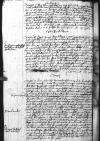Letter #4063
Ioannes DANTISCUS to Nikolaus FRIEDWALDHeilsberg (Lidzbark), 1545-06-17
Manuscript sources:
| ||||
Text & apparatus & commentary Plain text Text & commentary Text & apparatus
Unsernn etc.
Bey dem negstnn botnn sein disse brive zu den unsernn beyzulegen noch geblibnn, / die wir hiemit noch schicken. Wir habnn ouch we... in Ewer Herlichkeit sache mit des hern
Datum aus unserm schlosse
